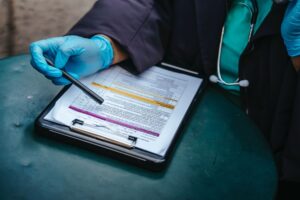What is an autism test for kids?

“The earlier the better” is a motto to keep in mind when even speculating on if your child may or may not be experiencing developmental delays or in need of an autism test.
Diagnosing autism spectrum disorder (ASD) can be complex for doctors, as there is no traditional autism test. ASD is often referred to as being a spectrum due to the broad range of behaviors and their severity. Because of this, much of the diagnosis relies on observing the child and listening to concerns from parents, pediatricians, daycare providers, or other family members who know them well.
Most pediatricians will monitor for developmental delays during well-visits, providing your child with assessments at their 18-month and 24-month check-ups. This is standard for all children. Parents can express concerns if any and answer questions from the pediatrician regarding family history, their child’s behavior, and whether their child is hitting designated milestones. If you believe your child is experiencing developmental delays, this is the time to say something.
What Are Doctors Looking For?
When assessing your child at their 18 and 24-month checkups, your child’s pediatrician may ask some of these questions:
- Does your child respond to their name?
- Does your child have trouble making eye contact?
- Does your child interact with others?
- Does your child engage in pretend play?
- Are any of their behaviors unusual or repetitive?
Answers often help gauge whether or not your child has any developmental delays that require further evaluation. An official autism screening is recommended and typically carried out by your child’s pediatrician at the 18 and 24-month well checks, but if not, you can always request one or complete the online autism screen the M-CHAT-R (Modified Checklist for Autism in Toddlers, Revised) https://www.autismspeaks.org/screen-your-child. The M-CHAT-R is a short diagnostic screening survey to be completed by parents to identify autism symptoms.
While the M-CHAT-R is not an official diagnosis of autism, the results can help let you know if further evaluation is needed, and if so, your child’s doctor will refer you to a specialist for a diagnostic evaluation.
Next Steps
Once you have expressed concern to your child’s pediatrician, they will refer you to a specialist, such as a developmental pediatrician, pediatric neurologist, or clinical psychologist. Some organizations use a multi-disciplinary approach which could include a speech therapist, and/or occupational therapist as well. These professionals will utilize widely recognized tools and measures most appropriate for the child’s age.
When it comes to choosing which measures to use when determining if a child has ASD, there is no one size fits all. An individualized approach for each child will yield the most accurate and relevant results. Check with your child’s insurance provider in advance to see if there are any specific requirements needed to document a diagnosis.
Once all data has been collected, following the official evaluation, a formal and extensive report will be drafted and shared with the child’s family with an opportunity for review and discussion. This report usually takes about 30 days but can vary based on the provider. Findings from the diagnostic evaluation will determine what kind of support or therapy is recommended.
Other Details to Know about ASD Evaluations
Assessments, questionnaires, and tests can all seem very overwhelming for parents, especially if you are not very familiar with autism in general. Luckily, there is an amazing community of professionals, resources, service providers, and other parents who are willing and eager to assist.
With results from the evaluation, depending on the child’s age, a specialist may recommend your child partake in specialized educational programs, and/or early intervention services, which could include: primarily ABA therapy or a combination of ABA paired with speech therapy and/or occupational therapy. Social skills, communication skills, self-care, and pre-academic skills are commonly worked on in these therapies. Families are encouraged to consider their options and enroll in a program that best satisfies individual needs, clinical indications, and the entire family’s dynamic.
Here at Ally Behavior Centers, we have in-house licensed clinical psychologists on staff who have dedicated their careers to evaluating young children for the presence of ASD. https://allybehavior.com/services/diagnostic-evaluations-for-autism/
We also offer, full-time, center-based ABA therapy for young children who have not yet entered the school system, to equip them with the skills and tools necessary for each child to learn, grow, and live their best lives. Click the link below to find out more about our ABA therapy program.
https://allybehavior.com/about-us/our-collaborative-approach/
[Resources]
https://www.webmd.com/brain/autism/how-do-doctors-diagnose-autism